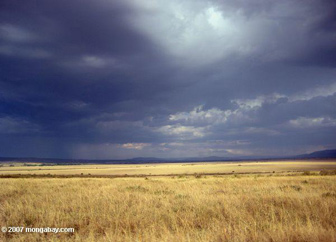Organic fertilizers could sequester carbon, slow global warming
Organic fertilizers could fight global warming
SAGE Publications UK
February 27, 2008
Composting might be a way to offset greenhouse gas emissions, according to a new study.
Applying organic fertilizers, such as those resulting from composting, to agricultural land could increase the amount of carbon stored in these soils and contribute significantly to the reduction of greenhouse gas emissions, according to new research published in a special issue of Waste Management & Research (Special issue published today by SAGE).
Carbon sequestration in soil has been recognized by the Intergovernmental Panel on Climate Change and the European Commission as one of the possible measures through which greenhouse gas emissions can be mitigated.
One estimate of the potential value of this approach — which assumed that 20% of the surface of agricultural land in the EU could be used as a sink for carbon — suggested it could constitute about 8.6% of the total EU emission-reduction objective.
“An increase of just 0.15% in organic carbon in arable soils in a country like Italy would effectively imply the sequestration of the same amount of carbon within soil that is currently released into the atmosphere in a period of one year through the use of fossil fuels,” write Enzo Favoino and Dominic Hogg, authors of the paper.

Restoring soil carbon can reverse global warming, desertification and biodiversity loss (02/21/2008) Restoring the ability of soil to store carbon by promoting native grasses and vegetation can help reverse global warming, desertification and biodiversity loss, says an Australian researcher. Land use change — including deforestation, bush fires, and soil degradation — accounts for roughly 20 percent of global greenhouse gas emissions, but land management practices can be used to reduce emissions. While reforestation and avoided deforestation have garnered a lot of attention of late, restoration of other forms of vegetation can dramatically increase the capacity of degraded landscapes to store carbon. |
“Furthermore, increasing organic matter in soils may cause other greenhouse gas-saving effects, such as improved workability of soils, better water retention, less production and use of mineral fertilizers and pesticides, and reduced release of nitrous oxide.”
However, capitalizing on this potential climate-change mitigation measure is not a simple task. The issue is complicated by the fact that industrial farming techniques mean agriculture is actually depleting carbon from soil, thus reducing its capacity to act as a carbon sink.
According to Hogg and Favoino, this loss of carbon sink capacity is not permanent. Composting can contribute in a positive way to the twin objectives of restoring soil quality and sequestering carbon in soils. Applications of organic matter (in the form of organic fertilizers) can lead either to a build-up of soil organic carbon over time, or a reduction in the rate at which organic matter is depleted from soils. In either case, the overall quantity of organic matter in soils will be higher than using no organic fertilizer.
“What organic fertilizers can do is reverse the decline in soil organic matter that has occurred in relatively recent decades by contributing to the build-up in the stable organic fraction in soils, and having the effect, in any given year, of ensuring that more carbon is held within the soil,” they explain.
But calculating the value of this technique to climate change policies is complicated. To refine previous calculations and to take account of the positive and negative dynamics of carbon storage in soil, Favoino and Hogg modelled the dynamics of compost application and build-up balancing this with mineralization and loss through tillage.
Their results suggest that soils where manure was added have soil organic carbon levels 1.34% higher than un-amended soils, and 1.13% higher than soils amended with chemical fertilizers, over a 50-year period. “This is clearly significant given the evaluations reported above regarding carbon being lost from soils, and the increasing amount of carbon dioxide in the atmosphere,” they say.
This article is a modified news release, Compost can turn agricultural soils into a carbon sink, thus protecting against climate change, from SAGE Publications UK













